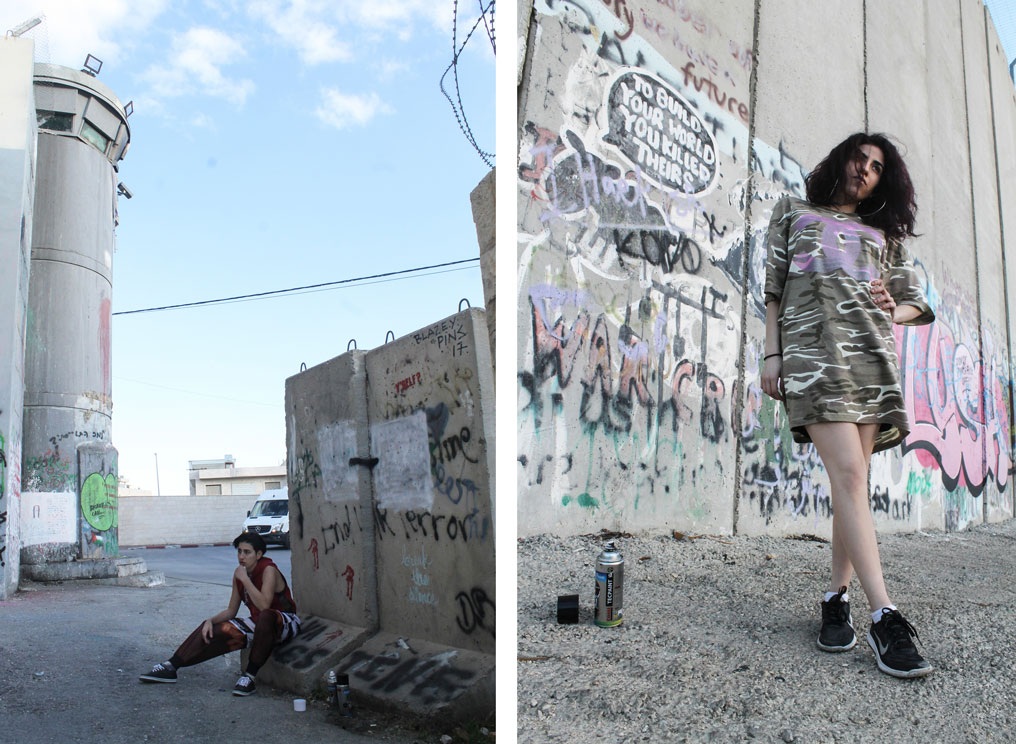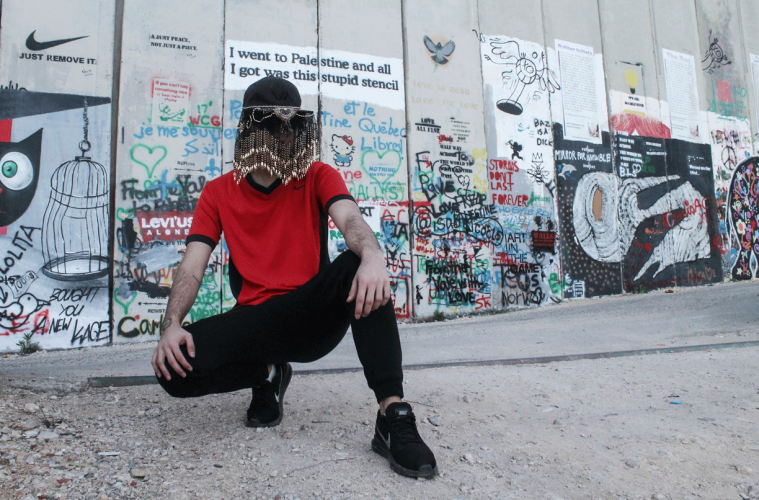المقال بالعربي هنا
Words by: Majd Karem
Photographed by Shukri L. – Palestine
Translated by Nour D.
Sitting editor: Eliza Marks
Characters: Reem K., Marineh Y., Shukri L.
On June 26th, 2015, a critical event changed the world. On this particular day, the United States of America legalized same-sex marriage. Shortly after the decision, the apartheid wall in Ramallah, Palestine, was painted with rainbow colors that represent the Lesbian, Gay, Bisexual, Trans, and Intersex (LGBTI) community, sparking controversy in Palestinian news media and social media. In response, a number of Palestinian youth covered the rainbow flag with white paint.
The painting of rainbow colors on the apartheid wall demonstrated the connection between and support for local and global LGBTI issues.The converse response to that action, the whiting-out of that painting, marked a new phase of Palestinian social dynamics related to homophobia, discrimination, and prejudice was ushered in. If nothing else, this chain of events demonstrated the importance of engaging in a discourse to examine public perceptions of homosexuality within the Arab context.
There are two major assumptions that must be considered regarding the apparent Palestinian fear of homosexuality: that many consider homosexuality to be a colonial idea and a product of Western culture, and homosexuality is often seen as incompatible with Palestine’s dominant religions. Could these assumptions be considered the cause of this fear?
To understand the global context of this action, it is important to first examine gay rights in the United States related to (a) same-sex marriage legislation and (b) the discrimination against gay immigrants. These two factors, one progressive and the other discriminatory, reveal a continuity of the colonial project in the United States, which is framed by the mistreatment of people of color and members of the LGBTI community. Israeli “pinkwashing” policies, which promote the country as a LGBTI-friendly nation, demonstrate a similar colonial continuity and the attempt to improve its global image to be in line with that of open, liberal, democratic states. This has a direct effect on Palestine, where anti-gay sentiment is often justified by social and religious factors, but also is the result of a colonial problem rather than a solely cultural one.
When considering Israeli policies on homosexuality through the lens of colonialism, it becomes clear that these policies are designed to deepen the power disparity between Palestinians and Israelis, and break down Palestinian communities, the “colonial subjects.” Israel might promote LGBTI openness for its own people, but this does not extend to Palestinian communities. Israel only changes its policies on sexual orientations and gender identities for Palestinians if it serves their exploitation of the individual and land. This, in turn, damages the social life of Palestinian homosexuals within their communities, causing a new phase of increased suspicion of LGBT peoples, and describing them as traitors working Israeli Mossad. Israel’s actions regarding homosexuality are insidious and threaten to break Palestinian social fabric from within. .
The assumption that homosexuality is alien to Palestinian culture and is simply a creation of western culture to distort the morals and values of society heightens discrimination against homosexuality. Sheikh Kamal Al-Khateeb, the Vice President of the Islamic Movement in the northern part of 1948 occupied lands, used violent rhetoric in political and religious contexts to shame homosexuals, and to claim that they and the homosexual movements in Palestine are contradictory to Palestinian society and its fundamental values and norms, which tend to be religious.
Statements suggesting dissonance between homosexuality and Palestinian culture also appear beyond conservative or religious realms, as seen when Joseph Mas’ad, professor at Columbia University, wrote that,“…western sexual identities and all the movements and organizations calling for homosexuals’ rights impose the “homosexual” identity on many men who may not identify as homosexuals…”. This statement by Mas’ad is part of his defense of a theory that argues homosexuality is colonial, and that to some extent, it is dangerous to our culture!. However, his point is invalid, firstly, because we should not be considering the relationship between Palestine and/or Arab World and “the West”, but rather Palestine as a nation subject to colonial rule. Secondly, the entity of Palestinian society is diverse in it’s sexual identities, names for these, and how they are practiced. Mas’ad might be considering sexual culture that prevailed in previous periods, but perhaps he did not consider the evolution of sexual practices and sexual expressions of orientations and desires according to the changes of society’s characteristics and conditions on both global and local levels.

Right: Reem is wearing from tRASHY CLOTHING.
Left: Marineh is wearing from W.I.A.
Interestingly, individual local reactions varied and often contradicted themselves, supporting homosexuality in the global context while denouncing it in local contexts. This contradiction is evident immediately following the incident described at the beginning of this article, when in people changed their Facebook personal profile pictures, using the filter that contains the phrase “LOVE WINS”, and simultaneously denounced and insulted those who painted the wall of apartheid with rainbow colors that symbolize the global LGBT+ movement, which they claimed does not belong to the Palestinian culture. One could explain this contradiction by considering the desire the colonized might feel to possess the lifestyle of their colonizer. The colonized might have taken on the characterization the colonizer has given them literally and metaphorically — ones of poor values morals, who live in a disreputable place, and who suffer from hunger and poverty. Homosexuality may be permissible for Palestinians if it is seen as a feature of the colonizer’s society, but wrong when it is embodied by a member of “their own.”
The events surrounding the painting of the apartheid wall at the Qalandia checkpoint are very symbolic, as they (a) magnify the controversy that arises between public and private spheres and social norms and between local and global movements related to homosexuality, and (b) highlight that this issue is one affected by the power relationship between the colonizer and the colonized, and how that relates negatively to artistic freedom and gender expression.
The artist raised two points when he tried to justify his work and explain it to its critics: the feeling of being threatened by his own community/soceity and the need to express this through art, and the influence that arts have in Palestine as a reflection and contestation of society and its norms. Even discussion of these events in Palestinian newspapers and websites show the potential of a very real threat to artistic, identity, and gender expression in the future. In this case, both the colonized and the colonist play a role in suppressing the weakest group in this context; Palestinian LGBTI are doubly marginalized .
Sexuality and what is considered sexual remain taboo in Arab culture, especially when related to females or that deemed feminine. The assumption is that homosexuality tends to be femininity, and it is therefore forsaken and should not spoken of. The fear of homosexuality in this context is closely connected to feminist movements, patriarchal society, and the absence of social awareness of the masculine crisis in the challenge of the multiple gender identities which ended the division based on gender binary. This is especially in conservative communities like that of Sheikh Kamal Al-Khateeb. Conflicts about homosexuality and female empower are rooted in a patriarchal culture that fears any change that might threaten its authority, like other global patriarchal regimes, and is intertwined with other social, economic, and political issues like those presented by colonialism . There is great potential for activists for feminism and LGBT work together against global and local social injustices on all levels.

